Select is editorially independent. Our editors selected these deals and items because we think you will enjoy them at these prices. If you purchase something through our links, we may earn a commission. Pricing and availability are accurate as of publish time.
Hair care brand Alodia had been working toward its first-ever retail partnership with Target for most of 2021 before it finally received the long-awaited purchased order in August — but the good news arrived during one of the most challenging times for the company.
For nearly half of 2021, more than 50 percent of Alodia’s products were out of stock given global supply chain constraints. By the time Target’s order came in, the small business wasn’t poised to fulfill it: Since Alodia is self-funded and can’t turn to investors for help, owner Isfahan Chambers-Harris wasn’t sure where the money would come from. And that’s when Alodia encountered a “game changer,” Chambers-Harris told us: The brand was awarded the Pharrell Williams Black Ambition pitch competition, earning it a $250,000 award, among other things. Three weeks after the Target order arrived, the money was deposited and Alodia had an answer to the funding it needed.
“This truly was a godsend,” said Chambers-Harris. “We could keep our business afloat while we waited for inventory to restock.” She added that fulfilling Target’s orders further propelled the company forward — throughout 2022, Chambers-Harris plans to secure investors and additional retail partnerships for Alodia.
SKIP AHEAD Black-owned businesses and Covid | 100+ Black-owned businesses worth considering
We are always held to the highest standards of perfection because of the stigma of our race.
WHITNEY WHITE, CO-FOUNDER, MELANIN HAIRCARE
Pandemic-related supply chain issues, inflation and labor shortages have caused disruptions for business owners across the board. But for many Black entrepreneurs, that’s compounded by disparate challenges they’d encountered long before the pandemic, including a lack of access to capital and higher rates of financial distress compared to white-owned businesses. Those obstacles can often transform into an additional and collective struggle.
“The biggest challenge with being a Black-owned business specifically is that we are under immense pressure to be perfect at all times,” said Whitney White, co-founder of Melanin Haircare. “We are always held to the highest standards of perfection because of the stigma of our race — if we have any margin of error, it’s our Blackness that is to blame.”
While overcoming pandemic-related hurdles and changing circumstances, Black business owners like Chambers-Harris and White are uncovering new support systems and opportunities to grow their businesses and adapt. In fact, the number of Black business owners grew 40 percent from pre-pandemic figures, reaching 1.5 million by August 2021.
To be considered a Black-owned business, the Census Bureau says a company must be at least 51 percent Black-owned — that’s similar to its ownership definition of Latino-, AAPI- and women-owned businesses. But ownership changes over time, as we reported last year: Carol’s Daughter and SheaMoisture, for example, are no longer Black-owned businesses after L’Oreal and Unilever bought each, respectively.
We also connected with over 200 Black-owned businesses to recommend ones we think are worth considering for products across skin care, clothing and accessories, home goods and more. We also talked to 15 business owners about their experiences throughout the past two years.
Related
Fashion experts’ favorite Black-owned clothing brands
15 notable products from Black-owned businesses in 2022
After asking more than 200 businesses about their ownership stakes, we narrowed down some notable products from 15 different Black-owned brands across major categories we think Select readers should know about — including homewares, apparel and skin care. Following this list, we share more than 100 other businesses who confirmed to us their status aligns with the Census Bureau’s definition of a Black-owned business.
Absolutely Everything Curly Ultimate Guide: Co-Washes
Owner Gaby L. Longsworth founded Absolutely Everything Curly with the desire to educate people about textured hair, hair products and ingredients. The company offers a handful of guides on haircare topics you can download through its website, including those about hair products for curly haired kids and babies, hair oils and butters, frizz fighters and more.
Absolutely Everything Curly’s guide to co-washes highlights the fundamentals of conditioner-only washing, its benefits and discusses different types of products you can use depending on your hair type. It also provides information about ingredients co-washes contain and more.
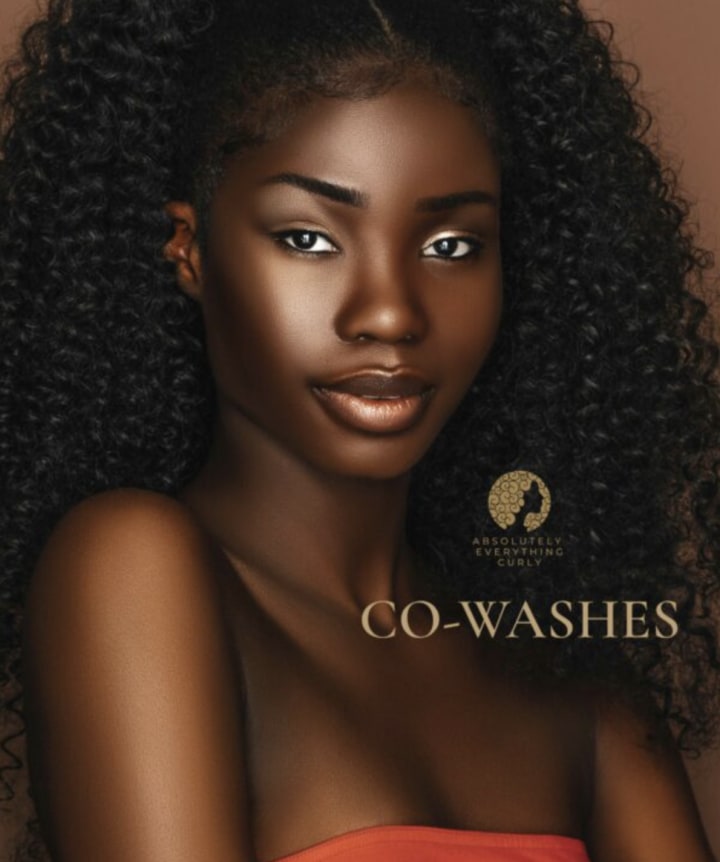
Absolutely Everything Curly Ultimate Guide: Co-Washes$9.99ABSOLUTELY EVERYTHING CURLY
Alodia Haircare Nourish & Grow Healthy Hair and Scalp Oil
Alodia offers hair care products Chambers-Harris said are made with non-toxic, organic and natural ingredients. She noted her goal is to educate and empower women about how to take care of their hair: “Alodia was birthed out of my personal experiences with unnatural, toxic hair care products,” Chambers-Harris said, who added she understands “first-hand the misinformation that exists around textured hair.”
According to the brand, this moisturizing oil nourishes the scalp, helps prevent hair breakage and promotes hair growth. The oil contains ingredients like avocado oil and rosemary, and you can use it as a pre-shampoo treatment, hot oil treatment while deep conditioning or over any hair styler.
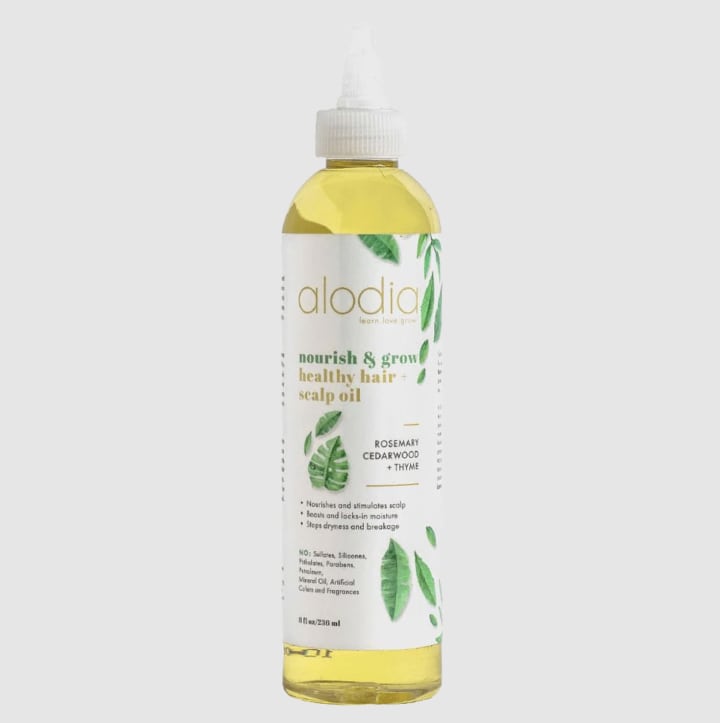
Alodia Haircare Nourish & Grow Healthy Hair and Scalp Oil$20.00ALODIA
Barkal Noir shoes
Habab El Rufaie, founder and creative director of Barkal, said the brand offers “a gender-neutral footwear collection that is derived from traditional Sudanese men’s shoes.” To get materials for what El Rufaie called culturally treasured footwear, Barkal works with suppliers in Italy — and El Rufaie said the brand faced stressful supply chain issues when the country’s factories shut down in 2020. However, she said 2021 was a more positive year for the brand as it was able to get back on track with manufacturing and saw an increase in sales due to an uptick in online shopping.
Available in a variety of colors like Tangerine, Olive, Taupe and more, shoes in Barkal’s Core Collection are made from nappa leather and come in two widths: Narrow or wide. The brand also has a Canvas Collection available.
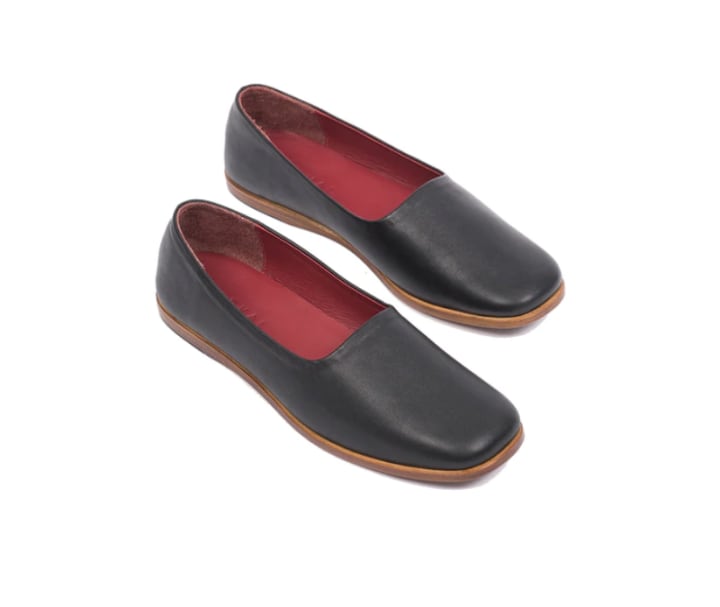
Barkal Noir shoes$250.00BARKAL
Eve Milan New York Brightening Vitamin C Toner
Eden Gilliam, an esthetician and founder of Eve Milan New York, was inspired to start her businesses after becoming a mother and wanting to leave a legacy for her daughter. Since she began her company, Gilliam said the resources, information and emotional support available to Black business owners have greatly increased, and she’s had the opportunity to learn and grow from entrepreneurs who came before her.
Eve Milan New York offers a range of skin care, from cleansers to serums. Its Brightening Vitamin C Toner is designed to reduce dark spots and promote a more even complexion. It contains camu camu extract, which the brand said is a brightening antioxidant, as well as daisy extract. The product is also formulated with purslane, which the brand says boosts collagen synthesis, vitamin C, vitamin E and glutathione.
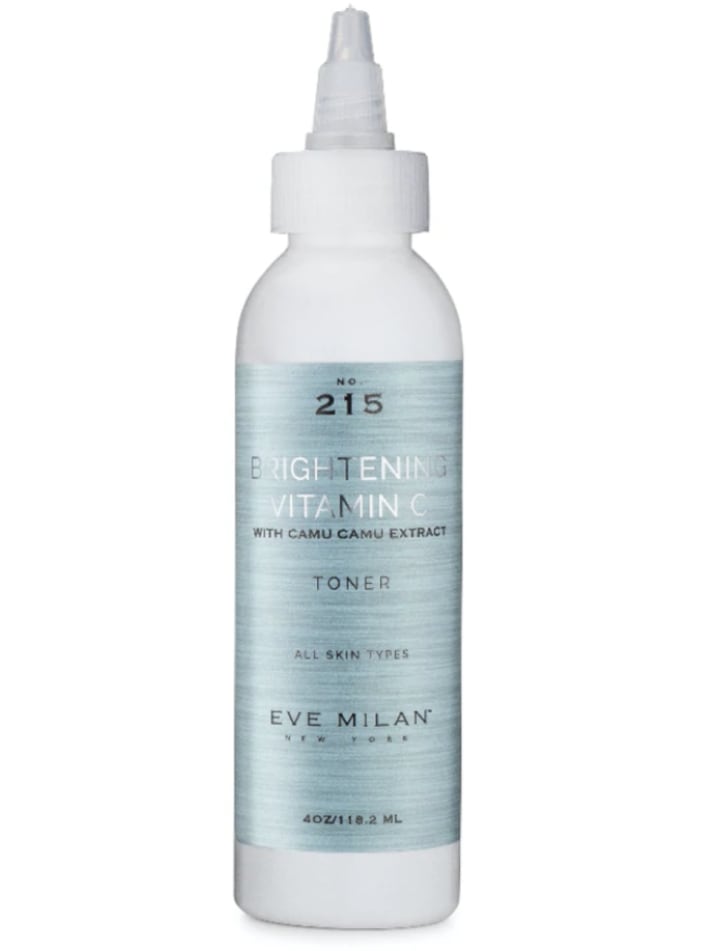
Eve Milan New York Brightening Vitamin C Toner$24.00EVE MILAN NEW YORK
Flora & Noor Shea Sugar Scrub
Jordan Karim, founder and CEO of Flora & Noor, got the idea for her company from her own skin care needs. “I saw a gap in the beauty industry for halal-certified skin care and clean products that target the skin concerns of those with melanin-rich skin,” she said. Karim was working as a pharmaceutical consultant in pharmaceutical skin care and she said none of the formulas she saw on the market fit what she was looking for, so she created her own. “Everyone, not just Muslims, deserve alcohol-free and animal by-product-free skin care that is backed by science. Our world is so diverse and I believe our skin care should reflect that,” Karim said.
Flora & Noor’s Shea Sugar Scrub contains exfoliating sugar crystals, moisturizing shea butter and nourishing colloidal oatmeal. It removes dead skin, cleans pores and moisturizes. The brand said the scrub is recommended for those experiencing skin dryness, dullness and uneven texture.
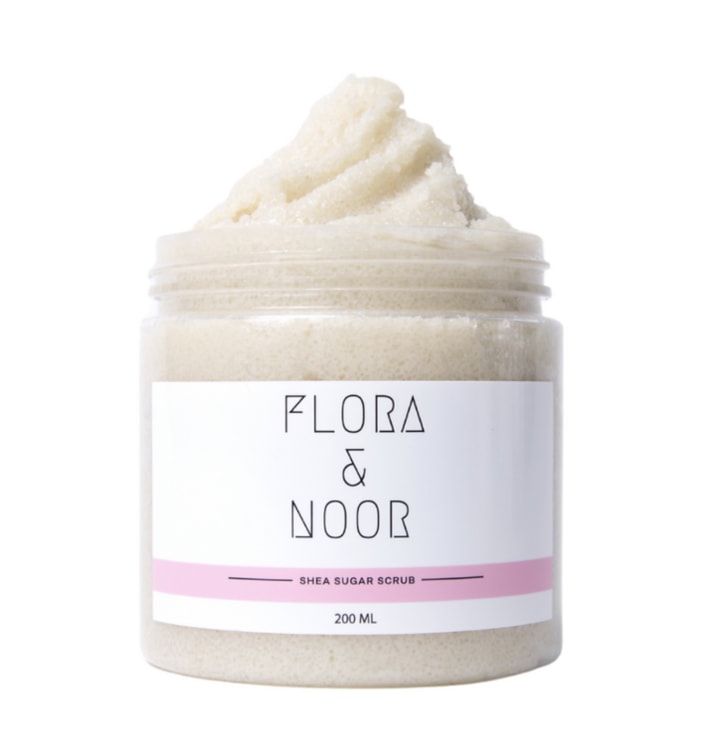
Flora & Noor Shea Sugar Scrub$24.00FLORA & NOOR
GOODEE Hammam Towel
While working in the fashion industry, Byron Peart, co-founder of GOODEE with Dexter Peart, said “we felt that there were so many extremely skilled and underrepresented ethical makers around the world who desperately needed a platform to connect them with an equally committed conscious consumer.” Switching gears from fashion to homeware, the co-founders established GOODEE to help fill that need. The retailer showcases a variety of brands and offers items like furniture, kitchen and dining products, decor and more.
GOODEE also offers its own line of products. The Hammam Towel is handwoven and designed from linen and GOTS-certified organic cotton. The towel features a loop you can use to hang it up, and it’s machine-washable. The Hammam Towel is available in four colors: Black & White, Green & Black, Multi Orange and Multi Purple.
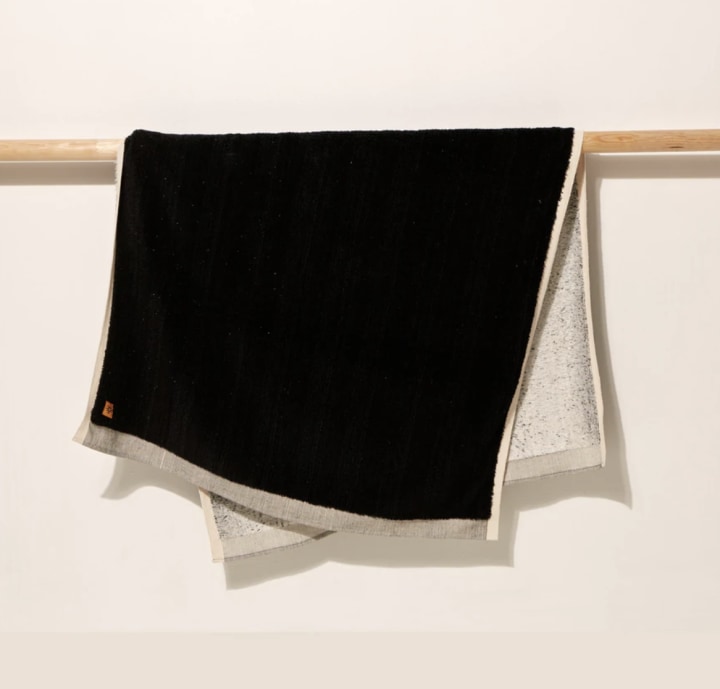
GOODEE Hammam Towel$199.00GOODEE
Melanin Haircare African Black Soap Reviving Shampoo
Years of recommending do-it-yourself hair care recipes and styling tips led Melanin Haircare’s Whitney White to start the company. White said “hair care as a consumer product is a need, not a ‘nice to have,’” and has seen success in sales despite facing pandemic-related challenges like price hikes for raw materials and shipping delays due to supply chain shortages.
Formulated with cocoa and shea butter, argan and B5, Melanin says this clarifying shampoo conditions hair, as well as promotes increased elasticity and flexibility of the hair. It’s also made with tea tree, black cumin seed, rosemary and peppermint oils, which have anti-inflammatory properties, according to the brand. Finally, the charcoal powder in the shampoo helps detoxify the scalp and gently exfoliate.
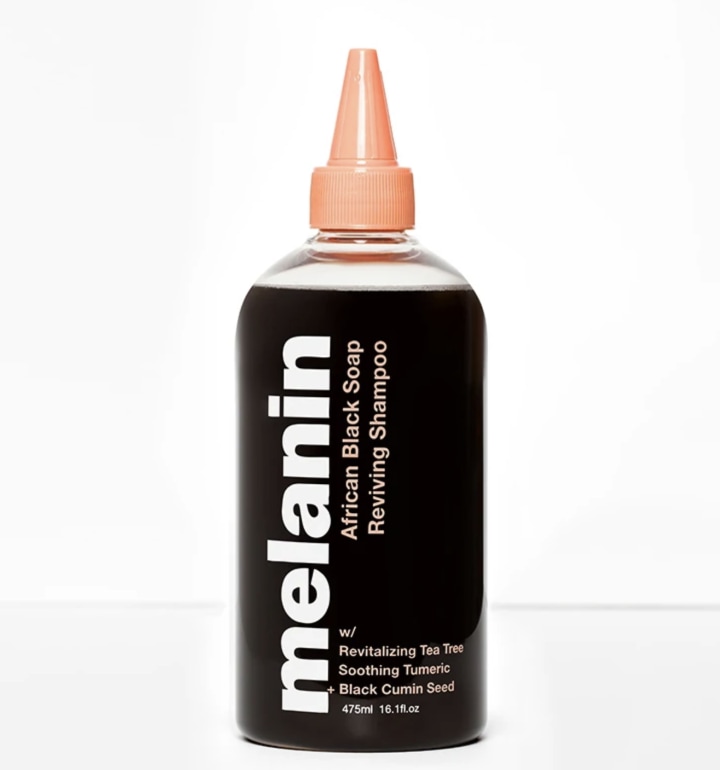
Melanin Haircare African Black Soap Reviving Shampoo$19.89MELANIN HAIRCARE
Partake Classic Pancake & Waffle Mix
Partake Foods was created as a way to find allergy-friendly snacks for founder and CEO Denise Woodard’s daughter. Woodard was frustrated by the lack of options for children like hers and wanted to create food people regardless of allergies or dietary restrictions could enjoy. To originally fund Partake, Woodard sold cookies out of her car and sold her engagement ring — now, you can find the brand’s offerings online and in stores nationwide, like Target, Whole Foods and Trader Joe’s.
Cookies were the first snack Partake launched in 2016, and they’re available in flavors like Chocolate Chip, Double Chocolate and Ginger Snap, as well as crunchy and soft baked options. The brand recently launched Classic and Confetti Pancake & Waffle Mix, which are top nine allergen-free, gluten-free and vegan just like the cookies. Partake also sells baking mixes from pizza crust to blondies.
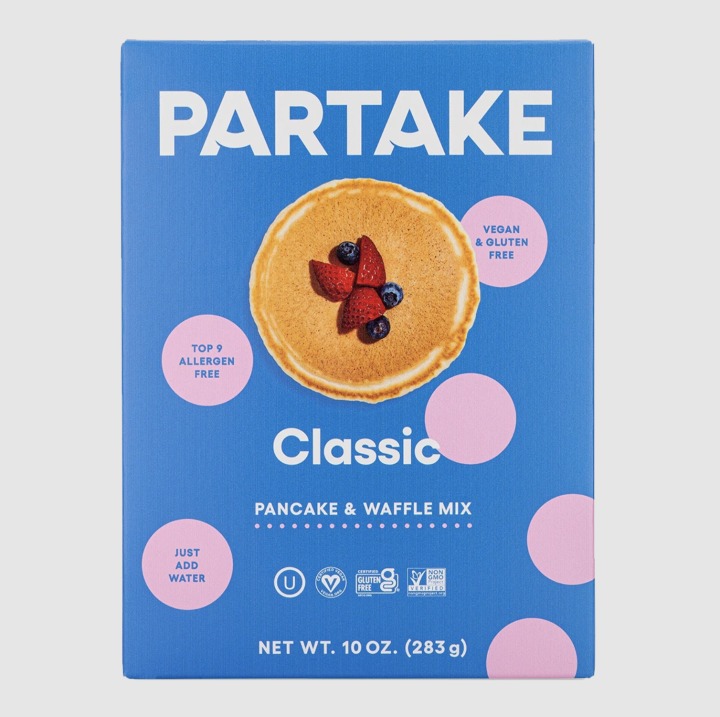
Partake Classic Pancake & Waffle Mix$23.99PARTAKE
Pierre Performance Never Thirsty Moisturizer
Working in the beauty industry, Jamal Pierre, founder of Pierre Performance, said he “saw a major gap in skin care that truly addresses men’s needs,” which motivated him to start his business. Pierre said he’s proud of being a Black business owner and wants to be successful not just for himself, but also to “provide an example and representation for other Black people watching me.”
Pierre Performance added glycolic acid to its Never Thirsty Moisturizer, which the brand said combats hyperpigmentation, dullness and signs of aging. It’s also made with hydrating jojoba oil and apricot kernel oil to soften skin, according to the brand.
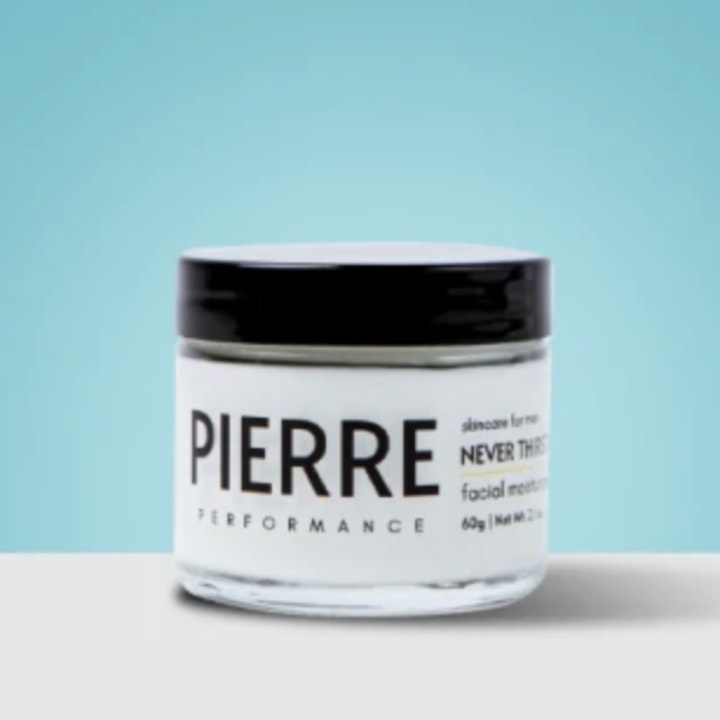
Pierre Performance Never Thirsty Moisturizer$30.00PIERRE PERFORMANCE
Renowned Women Tee
John Wesley Dean III, the creative director and founder of Renowned, said he started the clothing brand as a form of expression and to share timeless and refreshing pieces with customers. During his career, Dean said he’s noticed a lack of diversity as he’s climbed the corporate ladder, emphasizing the issues he feels still need to be addressed to help more Black businesses achieve success in the U.S. “This is a forever fight for equality,” Dean said.
This shirt from Renowned features the brand’s collegiate logo and a graphic patch is sewn over it. The shirt is made from cotton and comes in sizes ranging from small to XXL.

A Renowned Women Tee$55.00RENOWNED
Royal Nation Pete Hoodie
While raising her children, Lauren Hayes, Royal Nation’s founder and CEO, said she learned how important character identity is to their development, and to express their identity, kids often use their personal style choices. Royal Nation’s clothing is centered around different characters, each of whom plays a part in a saga and has their own unique story. Hayes said she hopes to encourage children to use their imagination, which can be translated through fashion.
Royal Nation’s Emerald Pete Hoodie is designed from cotton and features cotton ribbing on the sleeve cuff and hem. The hoodie has an embroidered knight’s crest on the center chest and graphic text on the back. It’s available in two other colors — Mulberry and Safari — and comes in kids’ sizes ranging from ⅘ to 14.
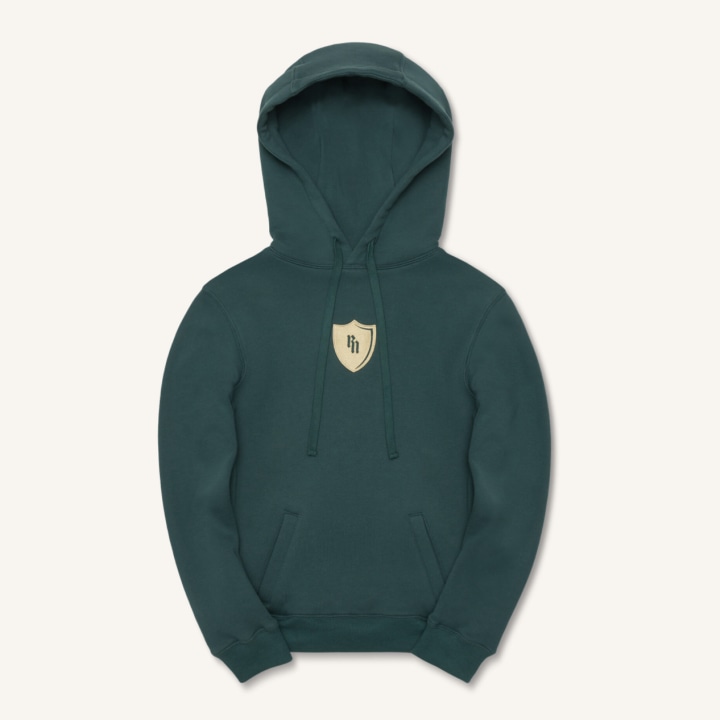
Royal Nation Pete Hoodie$65.00ROYAL NATION
The Sip The Classic Box
When she started The Sip, a luxury wine subscription service, Erica Davis, the brand’s co-founder and CEO, said she aimed to push back against norms in the wine industry, specifically in regards to what women and women of color were “supposed” to drink. “There’s an expectation that we like it sweet and pink,” Davis said. “While that may be true for some of us, it’s not true for all.” She added that The Sip aims to make “the entire Champagne and sparkling wine experience more approachable,” especially when trying new brands.
Whether you join The Sip as a member or purchase individual items, if you’re looking to try new beverages, the brand offers curated drink boxes. The Classic box comes with three bottles of champagne: Laurent Perrier, Moet & Chandon Imperial and Segura Vuidas. You can also choose between receiving the brand’s White Tulip Flute or a Sip Shooter.
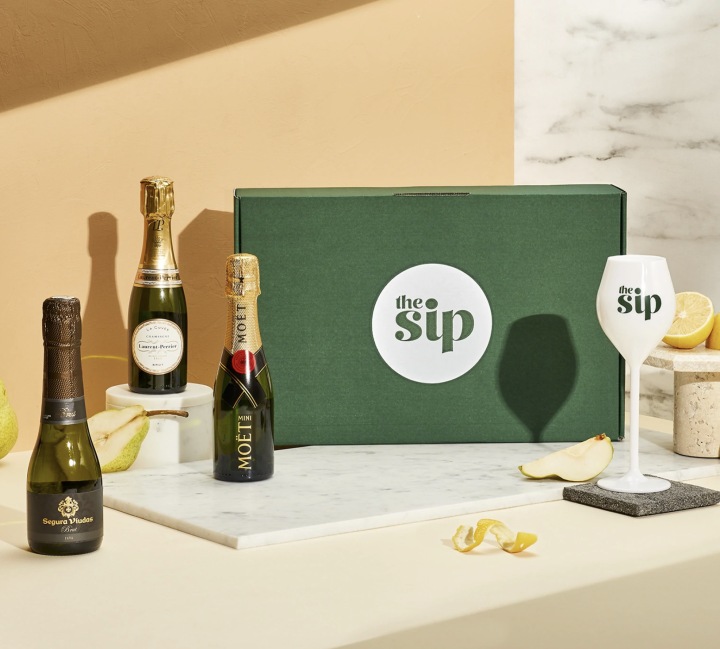
The Sip The Classic Box$65.95THE SIP SOCIETY
TinkyPoo Power Diapers
Nadiyah Spencer founded TinkyPoo in 2020 with the goal of creating a diaper company that “stands up to all the giants in the industry” while representing babies of color. “As a Black woman creating a diaper brand that celebrates our babies, I am living a dream that has now materialized,” Spencer said. “It shows my son and anyone watching that anything we put our minds to, we can achieve.”
TinkyPoo’s unisex diapers — which are available in a handful of colorful prints — are made with plant-based materials, sustainably harvest wood pulp and have an organic cotton inner-lining, according to the brand. They’re built with a double leakage barrier that provides up to 12 hours of protection, TinkyPoo said, as well as side wings and an elastic waistband. Diapers come in four sizes ranging from newborn to large, and you can purchase them in multiple quantities.

TinkyPoo Power Diapers$13.99TINKYPOO
UnSun Cosmetics EVERYDAY Mineral Tinted Face Sunscreen
When a trip to the dermatologist led Katonya Breaux, founder and owner of UnSun Cosmetics, to discover that moles on her face were the result of sun damage, she set off on a quest to find new sunscreen. But she found that chemical sunscreens were irritating and mineral-based options were often thick, white and pasty. “I had no success with finding tinted mineral sunscreens with shade options matching my skin tone,” Breaux said. “So I created a sunscreen that suits people with darker complexions, allowing me to start a conversation with my customers about the importance of sun protection for melanated skin.”
The brand’s EVERYDAY Mineral Tinted Face Sunscreen is available in two shades: Light to Medium and Medium to Dark. It offers SPF 30 protection and the UnSun Cosmetics said it’s smooth and silky when applied to skin, and won’t leave behind a white residue.
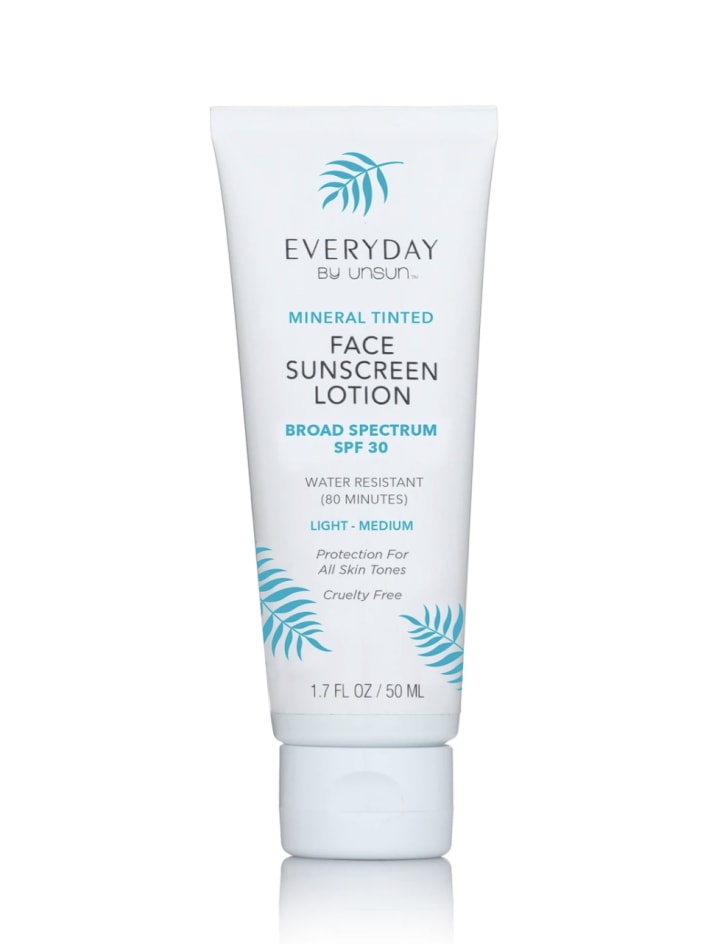
UnSun Cosmetics EVERYDAY Mineral Tinted Face Sunscreen$17.99UNSUN
Zach & Zoe Sweet Bee Farm Creamed Wildflower Honey
Kam and Summer Johnson, owners of Zach & Zoe Sweet Bee Farm, said the pandemic was the “perfect storm” for their online honey business to flourish. People were looking for natural remedies to cure ailments and alleviate inflammation, which the owners said honey is known for. And because the company’s ingredients and materials are made in the U.S., it was not impacted by global supply chain issues. Zach & Zoe was able to continue running its businesses online even when some stores that carry its products closed for a period of time, and the brand has attracted many new customers throughout the past two years.
According to the brand, Zach & Zoe’s Creamed Wildflower Honey contains a blend of many wildflowers gathered at different times of the year, which means that each harvest yields a different flavor. The brand also offers honey in flavors like Lavender, Lemon, Matcha, Creamed Coffee and more, as well as wildflower bee pollen and beeswax candles.
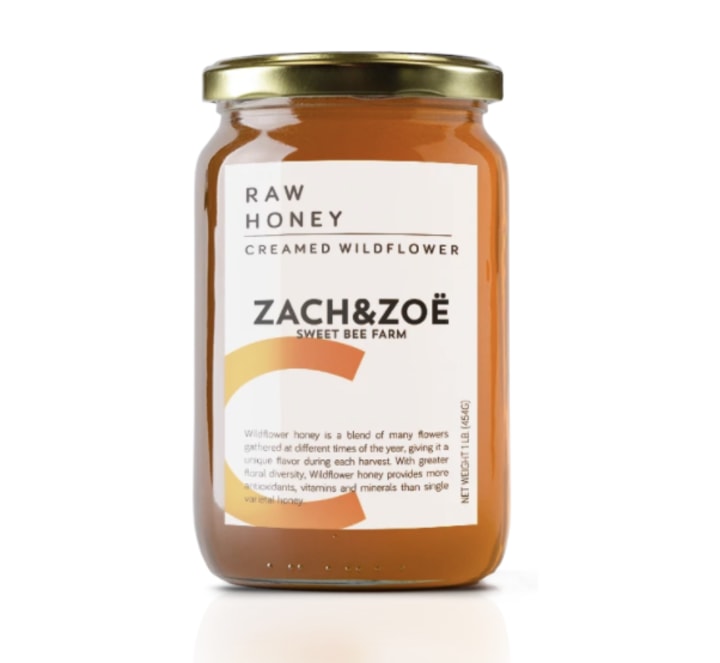
Zach & Zoe Sweet Bee Farm Creamed Wildflower Honey$20.00ZACH & ZOË
Related
10 books about Black history worth considering right now
Navigating the pandemic as a Black business owner
The pandemic remains at the front of business owners’ minds. We caught up with Partake Foods founder Denise Woodard, with whom we connected last year about the challenges she faced. Since then, Woodard has been able to expand onto the shelves of over 7,000 stores nationwide, she told us. But Partake’s path wasn’t always clear cut: In 2020, Woodard expected to significantly expand the company’s stores and put a chunk of its marketing budget toward in-person engagements, but the pandemic derailed that plan.
Woodard’s struggles at the beginning of the pandemic mimicked those of many Black entrepreneurs who shuttered their businesses at more than twice the rate of white business owners. The total number of Black-owned businesses declined by 41 percent between February and April 2020, compared to 17 percent among white-owned businesses.
We knew the business would be recession-proof, but [we] didn’t realize it would be pandemic proof.
ERICA DAVIS, CO-FOUNDER AND CEO, THE SIP
But Partake was able to quickly pivot to a digital marketing strategy, focusing on their social media presence, revamping their website and partnering with digital shopping vendors like Instacart. Pivoting to and remaining online has been very positive for Black businesses overall, according to Charles DeBow, executive director of the National Black Chamber of Commerce (NBCC). “Some businesses started to thrive because they were either already online or they were able to adapt quickly to this new way of doing business,” he said. DeBow added that Black business owners like Chambers-Harris have taken advantage of online-driven access to customers and advertising through the pandemic.
Other businesses, like sparkling wine and champagne delivery service The Sip, found even greater success specifically as a result of the pandemic.
“When we started The Sip, we knew the business would be recession-proof, but [we] didn’t realize it would be pandemic proof as well,” said The Sip’s Erica Davis. “Like many categories, online sales and delivery of alcohol skyrocketed over the past year and a half — many customers are just looking for ways to shop from the safety of their own homes.”
The challenge for many Black businesses is that they’ve operated in silos.
JOHN HARMON, FOUNDER AND PRESIDENT, AFRICAN AMERICAN CHAMBER OF COMMERCE OF NEW JERSEY
But for many brick and mortar businesses, lack of resources complicated the pivot: “The challenge for many Black businesses is that they’ve operated in silos — they may not be connected to chambers or business associations” that can provide the tools and funding to accommodate this shift, said John Harmon, founder and president of the African American Chamber of Commerce of New Jersey.
Access to capital was a major challenge and only further exacerbated by the pandemic, said Marlene Orozco, a PhD candidate in sociology at Stanford University who researches minority-owned businesses.
“Black-owned employer businesses are three times more likely than their white counterparts to report that the lack of access to capital had a negative impact on their profitability,” Orozco said. Indeed, reports from the Coalition to Back Black Businesses (CBBB) and the House Small Business Committee both cited barriers to accessing capital as issues facing Black business owners, and many Black business owners don’t apply for funding for fear of being rejected: 38 percent of Black employer firms — that is, Black-owned businesses with at least one paid employee other than the owner, according to the Census Bureau — felt “discouraged” from applying, as opposed to just 12.7 percent of white employer firms.
In fact, according to the House Small Business Committee report, large banks approve roughly 29 percent of loan applications from Black-owned small businesses compared to 60 percent from white-owned businesses — and Black business owners often have to take loans with higher interest rates.
Organizations like the U.S. Black Chambers and the Small Business Administration provide multiple resources, funds and programs to help Black entrepreneurs get their businesses off the ground. Some brands are even starting their own related initiatives. Partake’s Woodard, for example, paid forward her success with the launch of the Black Futures in Food & Beverage Fellowship Program, a seven-week virtual experience that gives HBCU students an opportunity to learn from leaders in the packaged goods and beverage industries through workshops, panels and more.Growth and ongoing support for Black-owned businesses
Black Americans, and especially Black women in the U.S., were disproportionately laid off or left their jobs during the pandemic — and some of them started their own businesses as a result. According to the latest data from the Census Bureau, there are over 3 million Black-owned businesses in the U.S., with 134,567 of those being Black-owned employer firms.
And despite the effects of the pandemic, Black business owners remain confident about the future: The CBBB report showed that 88 percent of business owners said they were “very optimistic” about their businesses going forward, and 65 percent said that 2021 was a better year for business compared to 2020.
RECOMMENDED

NEW & NOTABLEMarshall launches its smallest portable speaker

MOST PURCHASEDMost purchased products we covered in April

OUTDOORSIs a riding lawn mower worth it?

GIFT GUIDESMom-approved Mother’s Day gift ideas
We get to a point where emotions are high and there’s a sense of doing the right thing, but that begins to wane.
LARRY IVORY, PRESIDENT AND CEO, THE ILLINOIS BLACK CHAMBER OF COMMERCE
Activism during the pandemic in part fueled this optimism: George Floyd’s death and subsequent national attention to issues around discrimination and police brutality resulted in an uptick of support toward Black businesses, according to DeBow. Orozco noted corporations increased the allocation of financial resources to Black businesses, too, and stakeholders were increasing procurement and growth opportunities for Black entrepreneurs.
“Black businesses started to get included in the dialogue, and that’s where major corporations started asking, ‘What can we do?’” DeBow added. But the NBCC reported sales at many Black-owned businesses also plummeted back to their pre-Covid rates soon after.
“We get to a point where emotions are high and there’s a sense of doing the right thing, but that begins to wane,” said Larry Ivory, president, and CEO of the Illinois Black Chamber of Commerce. “We have to keep the issue in front of people.”
Related
15 new novels by Black authors to know in 2022
Black-owned businesses: Wellness, beauty, apparel and more
We reached out to over 200 businesses nationwide to compile interesting Black-owned companies in beauty, apparel, wellness and more that we think are worth checking out.Black-owned beauty and skin care brands
- Absolute Joi
- AJ Crimson
- BeautyStat Cosmetics
- Beneath Your Mask
- BLAC Minerals
- Black Girl Sunscreen
- Brown Butter Beauty
- Camara Aunique Beauty
- Danessa Myricks Beauty
- Epara Skincare
- Eve Milan New York
- Fleur De Lis Beauty & Esthetics
- Flora & Noor
- Gold Label Cosmetics
- GlowRx Skincare
- Hanahana Beauty
- The Honey Pot Co.
- Hue Noir
- JACQ’s
- KAIKE
- KLUR
- LAMIK Beauty
- LipLoveLine
- The Lip Bar
- Luv Scrub
- Organic Bath Co.
- Oyin Handmade
- Pear Nova
- Pierre Performance
- ROSE Ingleton MD Skincare
- ROSEN
- SkinBUTTR
- Unsun Cosmetics
- yFOY
- Adwoa Beauty
- Alodia Haircare
- Camille Rose
- Felicia Leatherwood
- Flawless by Gabrielle Union
- Kinky-Curly
- Melanin Haircare
- Pattern Beauty
- The Y by Yusef
- Uhai
- Uncle Funky’s Daughter
- Aliétte
- Art Comes First
- Asata Maisé
- Autumn Adeigbo
- DEMESTIK
- The Fitting Curve
- Island Tribe
- KAYADUA
- KEEXS
- L’Enchanteur
- Meji Meji
- Nia Thomas
- Pyer Moss
- Renowned
- Royal Nation
- Saint Ola
- Stevie Edwards
- Taylor Jay
- TELFAR
Black-owned jewelry and accessories brands
- Agnes Baddoo
- Anima Iris
- Ashya
- BARKAL
- Becki Coakley
- Chiegeshiuka Agu
- Coco and Breezy
- Edas
- FlameKeepers Hat Club
- Jam + Rico
- Johnny Nelson
- Jumz
- Kahmune
- Kendall Miles
- Khiry
- Love, Cortnie
- Mateo
- Mixed Millennial
- Octave Jewelry
- Perry Co.
- Petit Kouraj
- Rebecca Allen
- Salone Monet
- Shades of Shades
- SoleRebels
- Stella & Haas
- Shekudo
- Ten Wilde Jewelry
- Third Crown
- Tree Fairfax
- Twelve AM Co.
- Vavvoune
- White/Space
Black-owned home and kitchen brands
- Clare
- Ekua Ceramics
- Frolic and Sage
- GOODEE
- Harlem Candle Co.
- Johanna Howard Home
- Jungalow
- Rayo & Honey
- The Black Home
- xN Studio
- 54kibo
Black-owned wellness and fitness brands
- EleVen by Venus Williams
- Fourth Phase
- Glamourina
- Gymwrap
- HENRY
- Kemetic Knowledge
- Lukafit
- Roam Loud
- Tinkypoo
- Yema
Black-owned bookstores and educational brands
- Eso Won Bookstore
- Essence Book Gallery
- EyeSeeMe
- Legacy BookBar
- Loving Me Books
- Marcus Books
- Miss Read Books
- Semicolon Bookstore
- The Key Bookstore
- The Literacy Shop
- Uncle Bobbie’s Coffee and Books
- 44th and 3rd Bookseller
Black-owned food and beverage brands
- Adjourn Tea House
- A Dozen Cousins
- Charleston Gourmet Burger Co.
- Coco5
- Dope Coffee
- Egunsi Foods
- It’s Really Vegan
- Ivy’s Tea Co.
- Iya Foods
- Jones Bar-B-Q
- Misha’s Kind Foods
- Moonshot
- Partake Foods
- PowerBites!
- Salt N Sprinkles
- Theopolis Vineyards
- The Sip
- Zach & Zoe









More Stories
POSSIBLE REASONS WHY YOUR HUSBAND DONT WANT TO HAVE SEX WITH YOU.
Secretly all small business owners hate Amazon! What if they closed tomorrow…
David Shands Illuminates Cleveland with a Trailblazing Entrepreneurial Event